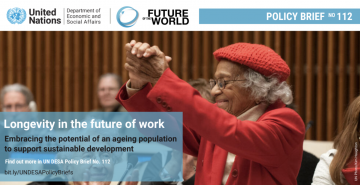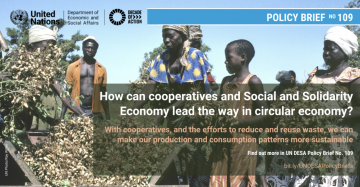Publications
Displaying 41 - 50 of 79
UN ECOSOC Reports on Social Development |
UN ECOSOC Reports on Social Development |
UN ECOSOC Reports on Social Development |
Policy Briefs |
PDF document available at: https://www.un.org/development/desa/dpad/wp-content/uploads/sites/45/publication/PB147.pdf
Old age disadvantage begins at birth
Much of the inequality between older persons has its roots in early life conditions. Without policies to prevent it, disadvantages reinforce one another through peoples’ lives, leading to large disparities among older adults. A life course perspective on ageing is critical to improving people’s health and well-being throughout the life course into old age.
Disability as a marker of inequality at older ages
The onset and severity of disability – affecting either physical or mental health – profoundly impacts the lives of people…
UN General Assembly Reports on Social Development |
UN General Assembly Reports on Social Development |
Policy Briefs |
Emergence of new forms of work
‘Standard employment’—understood as regular, full-time, and subject to labour law—remains the prevailing form of employment in high-income countries, however, new forms of employment have been rapidly gaining ground since the early 2000s. While new forms of work enabled by digital technologies have rapidly been expanding in more advanced economies, they are also spreading to emerging economies, where the effects on the labour markets are likely to be different. For instance, studies show that platform work, one of the new forms of work, has the potential to increase employment opportunities, promote formalization, and reduce gender gaps in emerging economies…
Policy Briefs |
Ongoing and emerging global trends, such as globalization, new technologies, the rise in global inequality, demographic shifts, climate change and threats generated by the ongoing COVID-19 pandemic, will dramatically impact societies and individuals of all ages, and will determine the nature and future of work.
At a time of persistent inequalities, an inclusive future of work is fundamental for sustainable development, ending poverty and leaving no one behind. Population ageing influences economic growth and labour force participation, and the share of persons aged 65 years and over in the labour force at the global level is estimated to continue the current upward trend in the…
Policy Briefs |
Introduction
In his report to the 59th Commission for Social Development on the priority theme of socially just transition towards sustainable development (E/CN.5/2021/3), the Secretary- General pointed out that “By adopting the 2030 Agenda, world leaders recognized that the current trajectory of economic development has not led to shared prosperity for all, but to high and rising inequalities in many countries, the climate crisis, and unsustainable consumption and production patterns. These consequences have taken a toll on social development and people’s well-being, especially among the most vulnerable.” The Report further analyzed the link between high inequality, consumerism…
 Welcome to the United Nations
Welcome to the United Nations



